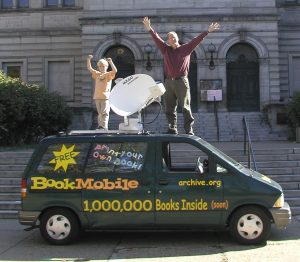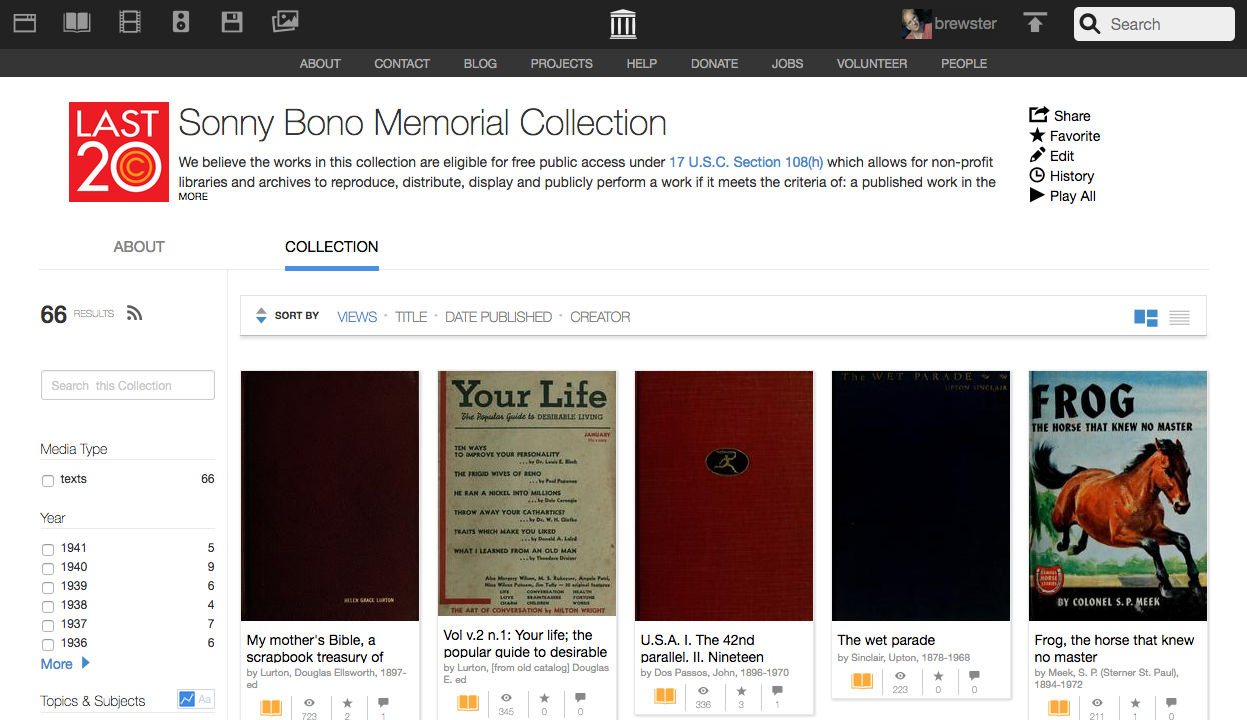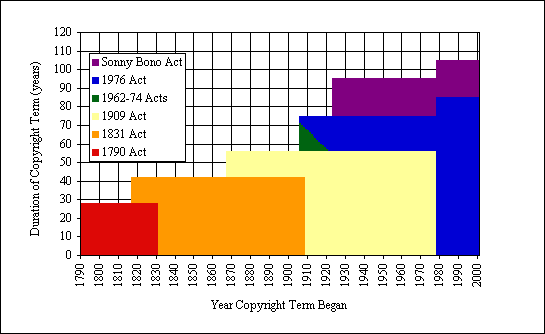[press: boingboing]
The Internet Archive is now leveraging a little known, and perhaps never used, provision of US copyright law, Section 108h, which allows libraries to scan and make available materials published 1923 to 1941 if they are not being actively sold. Elizabeth Townsend Gard, a copyright scholar at Tulane University calls this “Library Public Domain.” She and her students helped bring the first scanned books of this era available online in a collection named for the author of the bill making this necessary: The Sonny Bono Memorial Collection. Thousands more books will be added in the near future as we automate. We hope this will encourage libraries that have been reticent to scan beyond 1923 to start mass scanning their books and other works, at least up to 1942.
While good news, it is too bad it is necessary to use this provision.
If the Founding Fathers had their way, almost all works from the 20th century would be public domain by now (14-year copyright term, renewable once if you took extra actions).
Some corporations saw adding works to the public domain to be a problem, and when Sonny Bono got elected to the House of Representatives, representing Riverside County, near Los Angeles, he helped push through a law extending copyright’s duration another 20 years to keep things locked-up back to 1923. This has been called the Mickey Mouse Protection Act due to one of the motivators behind the law, but it was also a result of Europe extending copyright terms an additional twenty years first. If not for this law, works from 1923 and beyond would have been in the public domain decades ago.

Lawrence Lessig
Creative Commons founder, Larry Lessig fought the new law in court as unreasonable, unneeded, and ridiculous. In support of Lessig’s fight, the Internet Archive made an Internet bookmobile to celebrate what could be done with the public domain. We drove the bookmobile across the country to the Supreme Court to make books during the hearing of the case. Alas, we lost.

Internet Archive Bookmobile in front of
Carnegie Library in Pittsburgh: “Free to the People”
But there is an exemption from this extension of copyright, but only for libraries and only for works that are not actively for sale — we can scan them and make them available. Professor Townsend Gard had two legal interns work with the Internet Archive last summer to find how we can automate finding appropriate scanned books that could be liberated, and hand-vetted the first books for the collection. Professor Townsend Gard has just released an in-depth paper giving libraries guidance as to how to implement Section 108(h) based on her work with the Archive and other libraries. Together, we have called them “Last Twenty” Collections, as libraries and archives can copy and distribute to the general public qualified works in the last twenty years of their copyright.
Today we announce the “Sonny Bono Memorial Collection” containing the first books to be liberated. Anyone can download, read, and enjoy these works that have been long out of print. We will add another 10,000 books and other works in the near future. “Working with the Internet Archive has allowed us to do the work to make this part of the law usable,” reflected Professor Townsend Gard. “Hopefully, this will be the first of many “Last Twenty” Collections around the country.”
Now it is the chance for libraries and citizens who have been reticent to scan works beyond 1923, to push forward to 1941, and the Internet Archive will host them. “I’ve always said that the silver lining of the unfortunate Eldred v. Ashcroft decision was the response from people to do something, to actively begin to limit the power of the copyright monopoly through action that promoted open access and CC licensing,” says Carrie Russell, Director of ALA’s Program of Public Access to Information. “As a result, the academy and the general public has rediscovered the value of the public domain. The Last Twenty project joins the Internet Archive, the HathiTrust copyright review project, and the Creative Commons in amassing our public domain to further new scholarship, creativity, and learning.”
We thank and congratulate Team Durationator and Professor Townsend Gard for all the hard work that went into making this new collection possible. Professor Townsend Gard, along with her husband, Dr. Ron Gard, have started a company, Limited Times, to assist libraries, archives, and museums implementing Section 108(h), “Last Twenty” collections, and other aspects of the copyright law.

Prof. Elizabeth
Townsend Gard

Tomi Aina
Law Student

Stan Sater
Law Student
Hundreds of thousands of books can now be liberated. Let’s bring the 20th century to 21st-century citizens. Everyone, rev your cameras!


This is very cool. (Though, scrolling through the catalog, I’m pretty sure ASK MR BEAR is commercially available: http://a.co/aL5JTAS .)
Thank you, and you look right, we will fix that.
-brewster
Hi! Thanks! Yes, we found that “Ask Mr. Bear” was available with a new copy of the later version. It’s an interesting situation. What is a work? Is a 1930 version the same as the 1970 version? See the paper where we discuss these questions. In this instance, the data we had did not match the version at Amazon. So, the law students did not realize it was the same version. We are working to figure out how to address this in the future. The 1970s version was there but not the original. The beauty is that when there is an error like this, one can just remove its 108(h) status. My opinion. Not IA.
The “beauty” you describe seems pretty dirty to me.
There are more than a handful of extremely expensive reference books which are still in print and which also see very infrequent sales, typically direct to their niche consumer. As a result, many of these works are not carried by mainstream publishers or even available for purchase online. One title which comes to mind is a three-volume set which sells for around $200 per volume both new and used. If that tome were to be scanned and offered online, as much as “one can just remove its 108(h) status” upon notification – one CAN’T “just unscan and unshare” the book. There is no undigitizing. (The Internet Archive is reasonable evidence of that!)
The work I am thinking of has not been digitized. Ever. (Yes, I’ve looked. And no, it is not my own.) Due to its price and content, I am confident that the existence of a scanned copy would immediately wipe out the market for that title forever.
At first glance this problem appears similar to the orphan works issue but it really isn’t. Here, in the cases I am envisioning there actually is a rights holder. I can see a lot of lawsuits potentially turning on the thoroughness of a search, and frankly, that “Ask Mr. Bear” (see above) was somehow accidentally missed where all it took to uncover that error was typing three words into Google and clicking the first result…. that doesn’t bode well. In fact, it’s kind of scary.)
Your thoughts?
Will this also allow the Library of Congress to move the digital newspaper project further into the 20th century? Or fund The Internet Archive to help with that work?
http://chroniclingamerica.loc.gov/about/
I hope so on both counts. -brewster
Me too. Our Durationator tool includes periodicals and newspapers in assessing the copyright and 108(h) status. The future could be awesome!
Does this pertain to books published outside of the US?
How can a US law apply to publications outside US? A common sense answer to your question is no. 🙂
It applies to the foreign works still in the last 20 years of their term of protection in the US. Other countries have different exemptions to copyright, and nearly all use a very different system of determining copyright term – typically death of last surviving contributor plus xx years.
The US term for items first published after 1922 and before 1978 is publication plus 95 years, which makes it the world’s most complicated copyright law.
Confusing is right.
According to http://www.copyright.gov/circs/circ15a.pdf, if the post-1922 copyright expired before 1978, the work became public domain and remains so. For example suppose a work was copyright 1923, and the copyright was not renewed in the 28th year. That work was public domain after 1951 and remains so. So there are really two groups: 1923 to 1949, public domain unless renewed, and 1950 to 1977.
Note: “I am not a lawyer.”
Yes, what’s tricky is determining the copyright status of foreign works in the U.S., because most of them were restored. So, that’s where our research helps. But yes, foreign works are eligible in their last twenty years of copyright.
Regarding the term, yes, the maximum term for works first published between 1923 and 1977 is 95 years from first publication. As IMSLP is aware, the term can also be as low as “no term” or 28 years from first publication.
Because The US has forced many countries to comply with US copyright law through Trade Agreements much to the dteriment of many countries
Yes! Section 108(h) applies to works both first published domestically in the US and also outside of the U.S. It only applies to published works, at the moment, but the U.S. Copyright Office is recommending unpublished works be added as well. Super exciting if we start to make foreign works available in the last twenty years of the U.S. copyright. It DOES NOT apply to the copyright status OUTSIDE of the U.S. Only for activities within the U.S.
It would be great if there were a way people could sponsor books to be curated and “bumped” to the head of the queue. That would not only defray costs, but help identify books that are in demand.
Super cool idea. I would have loved this as a graduate student in European history. If we had a way for grad students and scholars to request books to see if they are Section 108(h) eligible, it would be amazing.
And if a publisher actively sells a new edition of a work, all libraries will have to withdraw the work involved?
That’s a good question. There is no discussion in the law of what happens if after a library makes a work available through Section 108(h) a work is then published by the copyright holder. There is a portion of the law that gives us a clue. It says that copyright holders can file a notice at the copyright office that they intend or are making the work commercially available. One way to think of this is that once you have done your due diligence, you would only have to take it down if there was notice. But not certain. It was not meant for the libraries to have the check and check and check. It was meant to allow library patrons to view works that are being neglected by their copyright owners. So, not sure. My opinion, not IA. There is also something to be said that the new interest in the book may be from the “making available” through Section 108(h), and the market was created by the new copy. So, one could see this as a boost for the publishers, and that sales would follow. But the law is not clear.
What about the bottom-feeders who take a PD text from Gutenberg into some self-publishing platform like Kindle Direct, slap a new “introduction” on the front (typically cribbed from wikipedia), and start selling it? Does that make a book “actively for sale”?
Unlike these PD text from Project Gutenberg, the books here are still covered by (extended) copyright, and since those “publishers” do no fall under the last 20 years library exception, they will potentially expose themselves to infringement claims.
Of course the copyright holder himself could do this very easily.
Yes it pertains to books published outside the US. Sonny Bono was dead when the law was passed so it’s a bit unfair to name it after him (but only a bit a he would no doubt have voted to pass it). The “Disney Collection” might be more apropos since it only cost Michael Eisner 600K in “campaign contributions” to get the ridiculous extension passed – chump change for the rodentines even in 1998. The best part was the lie told by “experts” about how it would “harmonize” with the rest of the world – when the opposite was true in a greater number of cases.
At any rate, it’s a great idea to leverage 108h. The above short history serves as a warning. The clock starts ticking again (after a 20 year freeze) in 2019 in the US. On Jan. 1 of that year, the works first published in 1923 get out of jail. In 2020, those first published 1924 … and so on. Mr. Eisner’s fellow mousketeers will no doubt be scurrying through the halls of congress soon, since “Steamboat Willie” was published in 1927.
Is IMSLP able to take advantage of 108h? I suspect many scores may fall under this provision.
The tome on this subject is Elizabeth Townsend Gard’s piece: https://papers.ssrn.com/sol3/papers.cfm?abstract_id=3049158. But it seems to be broadly applicable.
That’s interesting, and something we cover in the paper. What counts as a “library”? The U.S. Copyright Office in their recent discussion paper on Section 108 wants to make it harder for “hobbyists” to not apply the library exceptions. There is no definition of a library in the U.S. Copyright Act. So, you have to meet the requirements of Section 108 generally first. I’m curious if IMSLP believes it qualifies as well. Interesting… and what they think of the new discussion paper by the U.S. Copyright Office. See https://www.copyright.gov/policy/section108/discussion-document.pdf (released September 2017). I think (IMO) that they would. But my opinion, not IA.
We’re not sure, to be perfectly blunt. We’re definitely a digital archive or library. We concentrate on music (originally printed but now with sound recordings as well). One if the earliest strategic decisions made with respect to copyright was that our main servers are in Canada, whose law is far less convoluted. (The US law has become so complicated that it is literally 4 times the length of the nearest competitor). Section 108 appears to exempt music from many of the provisions in any case – without even beginning to get into the great dismal swamp of sound recordings made before 1972.
Even with the recent Disneyfication of Canada’s law with respect to recordings, those lawfully published before 1965 appear to be free (provided the underlying work recorded is also free of course). Back to the US – where we are incorporated – the recent ruling in the Turtles case (Happy Together) is of more interest to us than perhaps everyone but the participants as the vast majority of recordings we’ve been adding of late have no underlying works issues in play. The NY court basically ruled there was no performance right for pre-1972 recordings. That was just for NY. (For those unfamiliar with the issue, all pre-1972 sound recordings fall under the common law copyright of the individual states, not under federal law, until 2067. Hence, even a wax cylinder from the 1890s could be covered under common law copyright until 2067, as Naxos of America found out to its dismay about a decade ago.)
(More)
Canada’s general rule is pretty straightforward: 50 years after the life of the author – or last surviving contributor if there’s more than one involved. Certain classes of works (sound recordings, photos over a ceratin age, etc.) fall under a publication (or creation) plus ## years schema. It makes our job a lot simpler on the whole – though we have to deal with US status all the time as well.
I personally won’t hold my breath. Sure that clock looks like it’ll start, but when do the batteries get taken out again? Still, I believe Colbert was right in that cynicism is ignorance masquerading as wisdom.
And as Jason Scott put it: Something is better than Nothing. You people are doing something about the problem. Keep doing that.
Thanks, IMSLP, for your detailed reply, and for your years of fruitful labour in this domain!
Thanks for the announcement! I see Lynd’s _Middletown: A Study in Modern American Culture_ is in the initial collection, but I can easily find copies (new and used) for low prices (see e.g. bookfinder.com). Wouldn’t that disqualify it from being part of this program?
(More generally, how can we give feedback on books that seem to be included in collections liks this by mistake?)
you appear to be right, thank you for pointing it out. We moved it out of this collection.
We are finding it tricky to figure out how to automate this, but we will get better and faster.
-brewster
I found what the error was. The record had a comma, and not a semi-colon. That changes the result. So, we see that we have to make sure that we account for variances in punctuation. Not an excuse. A really interesting observation. We see data issues that have to be confronted on so many levels. Punctuation is now added to the list. Thanks for pointing that out.
When you have a comma, you get 3 used copies. https://www.amazon.com/s/ref=nb_sb_noss?url=search-alias%3Dstripbooks&field-keywords=Middletown%2C+a+study+in+contemporary+American+culture. When you put a semi-colon, you get a different set, including the one that you found. https://www.amazon.com/s/ref=nb_sb_noss?url=search-alias%3Dstripbooks&field-keywords=Middletown%3A+A+Study+in+Modern+American+culture&rh=n%3A283155%2Ck%3AMiddletown%3A+A+Study+in+Modern+American+culture
Thwarted by punctuation….. Interesting…
What is the effect of a book in this time period, which has been made available at TIA, that then become available for sale tomorrow, next month, next year. It appears that you would need to take down the title. Yes?
We don’t know legally, but IMO, no. The law has a mechanism that allows copyright holders to file a notice of normal commercial exploitation at the U.S. Copyright Office. It seems IMO that once the clock begins, a library should do a search, and then, that’s it. It is a “reasonable” search requirement, not “diligent.” But again, my opinion, not IA.
Bono’s widow wound up with his seat in Congress. She’s the one who named and sponsored the bill iirc. She was horrified that anyone else would be able to record his music someday.
“horrified that anyone else would be able to record his music”
Without paying her.
a minor error where it indicates “Sonny Bono was elected representing Los Angeles.” Sonny Bono was elected in 1995 and represented Riverside County until his death in 1998. The 44th district was later redistricted to cover sections Orange and Riverside Counties in 2003 and then Los Angeles in 2013. Sonny operated out of Palm Springs where he served as mayor from 1988-1992.
Thank you, I changed it, did we get it right?
Perfect!
What is still being overlooked by many people is that thousands of books published after 1923 are already in the public domain and can be digitized! The old copyright law required that a renewal of copyright had to be filed in the 28th year of the first term of copyright. If such a renewal was not filed, then the work fell into the public domain. The new law did not take anything out of the public domain that was already there. So a book published in, say, 1940, that was not renewed in 1968, should be available for digitization. The vast majority of copyrights were probably never renewed.
Good point, but renewal research is complicated and risky. At Project Gutenberg, we sometimes handle non-renewals, but the copyright research is often more work than scanning, digitization, and all other activities combined. Also, “punitive” damages in copyright-infringement cases can be so high as to put an organisation depending on volunteers and donations out-of-business permanently.
It would be nice to have a Distributed Proofreaders-like interface at archive.org to improve the accessibility and text-quality of those works.
Good point, but establishing that a copyright has not been renewed (and meets the other conditions for this exemption, i.e., of exclusive US authorship) takes considerable research. At Project Gutenberg we sometimes deal with non-renewals, and the research involved is often more work than all other activities to scan and digitize a book.
Besides that, the legal risks are large, as costs of copyright infringement cases and potential fines are so high, they will easily put a volunteer organisation out of business.
It would be nice to see a Distributed Proofreaders-like interface here at archive.org to help improve the OCRed text of these books.
The Hathi folks are busily identifying material whose copyright was not renewed. I think they have that area fairly well covered. What’s happening here is in addition to that effort and will open up even more of the public domain, since I assume they are ignoring works whose copyright was not renewed.
Hi Juliet,
I talked with Mike Furlough of Haithi on Friday. Their main constraint is the google contracts, but yes, I hope this 108h is going to help. Professor Elizabeth Townsend Gard’s durationator team is talking with them as well.
If you or anyone you know would like to help make a program to figure out the section 108h status of books, we have 23,000 that are in that time period. (we also have to figure out the registration issue).
Google Books was a concern for me when I read about this new concept. There are a number of old books I’d love to be able to read but I refuse to pay Google for the priviledge. How will this program release these books to public domain?
Stanford University has an awesome tool for searching the renewal records for books first published, 1923-1949. https://exhibits.stanford.edu/copyrightrenewals. It is awesome. (I think it’s based on the work at Project Gutenberg at proofing the records.)
We’ve taken the scans from IA (from the Copyright Office) and made a searchable database of all of the other records. We are still trying to finish it, but hope to have it available soon. And, my hope is that searching renewal records gets easier and easier. Greg Cram’s work at NYPL is helping with that. But there is much more that needs to be done. Renewal records for photographs, for instance…. a big problem.
Kory’s point is a good one, especially with respect to items first published in the US. There is a fairly decent online database at Stanford which covers most books. It does not cover items in other classes – notably Class E which was reserved for music (printed music, recordings did not fall under Federal law until 1972). The copyright office has never gotten around to ading the items published 1923-1950 to their online database, but they at least placed the whole series of the “Catalog of Copyright Entries” volumes here at archive.org, where you can do a virtual manual search for registrations and (more importantly) renewals.
Note that items whose “country of origin” – which usually translates to country of first publication – between 1923 and 1963 are eligible for “restoration” under the GATT/TRIPS amendments made 3 years before the Mickey Mouse Copyright Law. So, lack of a renewal does not mean such works are free, especially if the publisher or author’s heirs filed a Notice of Intent to Enforce starting in 1996.
The problem with the manual search at IA is that a copyright holder could register a work anytime during the 28-year term. Another problem is guessing what category the copyright holder registered the works in. Super huge mess.
And yes, restoration of foreign works means that a work that even if you don’t find a renewal record, the work may still be protected by copyright. Now you have to do a new set of calculations. I just taught this to my law students today. I thought their heads were going to explode.
Very true. In fact, one of the favorite tricks encoutered when we’ve done searches using these scanned volume – a number of which run into thousands of pages, by the way – is for the registration to be made one day before the renewal. The registration was allowed any time during the initial 28 year term. However, one could not renew without the item being registered in the first place, so if they waited too long …. Zap. Into the public domain it went. If you see an item with a 1930 copyright claim, it could have been registered as late as 1958.
Oh yes, the NIEs are quite a snakepit of surprises as well. We had the Azerbaijan National Library adding works of Azerbaijani conposers (naturally) – many largely unknown in the west. During the great sell-off / looting party in Moscow after the demise of the USSR, copyrights of a number of these composers ended up being NIEd by Schirmer, residing in some black hole for years thereafter. We informed ANL of the termination of grants and license provisions of the US law and some works were actually reclaimed by the Azerbaijan copyright agency on behalf of the composers. The ANL librarians get our medal of honor for their really going to bat for their composers. Many of these are now available at IMSLP under creative commons.
This is good and hopeful news. Somebody should set up a way to suggest titles for possible inclusion in these collections.
There are a lot of works between 1922 and 1932 which deserve attention. I’m thinking of the praised 1931 story collection Many Thousands Gone by John Peale Bishop which I found while compiling an online bibliography of fiction about the Civil War http://www.ghostlypopulations.com/random/biblio.xhtml . It’s just a short story collection (but a very fine one!), and yet on Amazon I have never seen used copies of it sell for under $300. According to the Stanford’s Copyright Renewal Database, the copyright was renewed, but the work itself hasn’t been sold for a long while and it hasn’t been digitalized.
This is just one example I know about, but I’m sure there are countless high quality works that people could make a compelling case for.
This is a perfect example of what Section 108(h) was designed for — if you can’t find a copy at a reasonable price and there are no new copies, the work is eligible (if it is the eligibility window of the last twenty years).
Excellent move. While in EU we’re deadlocked with pointless discussions about silly orphan works databases and useless licenses from publishers, at least in USA private initiative from Internet Archive (and hopefully others) just gets stuff done!
Quite ironic to name a public access system after the father of one of the worst acts of knowledge restriction in the last century, smart move as well. 😉
I want to see all the bios on engineers and scientists scanned!
Ed#
Thanks Internet Archive for preserving our history!
You are most welcome. Please find a way to participate and to help.
Thank you for publicizing this information! We at the Museums of the Bethel Historical Society are already getting started with taking advantage of this. I found a rare book in our collection from 1928, of which I could find only one copy available for $200, and scanned it today (https://archive.org/details/Metallak).
Of all people to be selectively approving only-positive comments on their blog… unbelievable! Now, it would make sense if I had written something nonsensical or had I lashed out with an ad hominem attack. But I wrote nothing of the sort! In fact, I simply brought up what I believed to be a realistic potential issue with the book scanning project. You know, the one you are trying to encourage other libraries to consider. How disingenuous of you. Any librarian reading your post would assume that the comments represent the spectrum of what people think. I raised a question and even asked Elizabeth Townsend Gard her opinion.
But my comment was rejected. Apparently because I didn’t write something like “Thanks, Internet Archive!” or “Excellent move!” or “This is hopeful news!” — like the previous three comments.
I wonder how many others were received that we aren’t seeing.
Fortunately, thanks to the Lazarus Chrome plugin I have a copy of what I wrote. I”ll find another place to post it with the rest of my thoughts. How are you happy with yourself, with what you are doing?
Please, please please – rename this collection. The reasons for the name will be forgotten over time, and it will be seen as a celebration of a man who helped take the world further into a dark period of commercialisation of everything.
Sonny Bono’s ‘legacy’ is about helping the richest few become even richer, not about the original intent of copyright (and patent and trademark) law. And wife-beating.
Naming part of the Internet Archive after that man may be intended as satirical, but will inevitably be seen as an honour – recognising someone who has done so much to hurt so many for the benefit of so few.